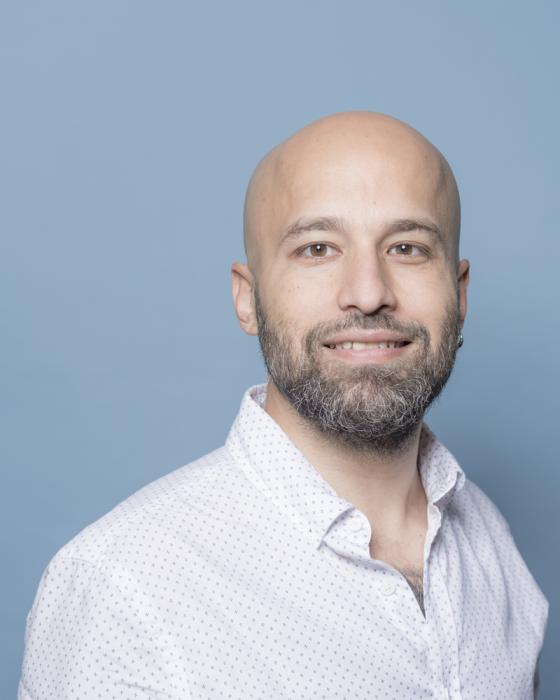dr. O.C. Akgun
Bioelectronics (BE), Department of Microelectronics
Expertise: Ultra low-energy digital/mixed-signal integrated circuits, asynchronous and subthreshold circuits, time-mode signal processing
Themes: Analog and Mixed-Mode Integrated Circuits and Systems, Bioinspired electronics, Biosignal acquisition, conditioning and processingBiography
Ömer Can Akgün was born in İstanbul, Turkey, in 1980. He got his B.Sc. degree in electronics and telecommunication engineering from Istanbul Technical University, Turkey in 2002. He received his M.Sc. degree in electrical engineering from the Ohio State University, USA in 2004, and the Ph.D. degree in microelectronics from École Polytechnique Fédérale de Lausanne (EPFL), Switzerland in 2009. He worked as a post-doctoral researcher at Lund University, Sweden until March 2010. In 2011, he started a digital sub-threshold consulting/design company, MystIC Microelectronics, with a start-up grant from Turkish Ministry of Science, and began working as an assistant professor at Ozyegin University until June 2012. In 2017 he obtained a Marie Skłodowska-Curie Actions (MSCA) Individual Fellowship (IF), and through the fellowship he currently holds a postdoctoral researcher position at the Bioelectronics Group of TU Delft.
He is experienced in multiple domains of IC design, namely analogue, digital and mixed-signal circuits. His research interests are asynchronous and sub-threshold operation, asynchronous information-to-digital conversion, time-mode signal processing, bioelectronics and analog/mixed-signal modelling and design automation. He is currently investigating time-mode asynchronous signal processing systems and their applications to neural recording interfaces as part of the MSCA-IF.
Publications
- On the longevity and inherent hermeticity of silicon-ICs: Evaluation of bare-die and PDMS-coated ICs after accelerated aging and implantation studies
Kambiz Nanbakhsh; Ahmad Shah Idil; Callum Lamont; Csaba Dücső; Ömer Can Akgun; Domonkos Horváth; Kinga Tóth; Domokos Meszéna; István Ulbert; Federico Mazza; Timothy G. Constandinou; Wouter Serdijn; Anne Vanhoestenberghe; Nick Donaldson; Vasiliki Giagka;
Nature Communications,
Volume 16, Issue 1, Jan. 2 2025.
document - A 10-bit, 771 nW Time-Mode ADC with a 2-Step TDC for Bio-Signal Acquisition
E. Kandilakis; W.A. Serdijn; O.C. Akgun;
In proc. 2021 IEEE Biomedical Circuits and Systems Conference (BioCAS),
IEEE, Oct. 6-9 2021. DOI: 10.1109/BioCAS49922.2021.9644997
document - A Chip Integrity Monitor for Evaluating Moisture/Ion Ingress in mm-Sized Single-Chip Implants
Omer Can Akgun; Kambiz Nanbakhsh; Vasiliki Giagka; Wouter Serdijn;
IEEE Transactions on Biomedical Circuits and Systems,
7 July 2020. DOI: 10.1109/TBCAS.2020.3007484
Keywords: ...
—Chip integrity, flexible implants, encapsulation, interlayer dielectric (ILD), silicon dioxide, resistance, time-mode, monitoring, reliability.
document - An energy efficient time-mode digit classification neural network implementation
Omer Can Akgun; J. Mei;
Philosophical Transactions of the Royal Society A - Mathematical, Physical and Engineering Sciences,
23 December 2019. DOI: 10.1098/rsta.2019.0163
Abstract: ...
This paper presents the design of an ultra-low energy neural network that uses time-mode signal processing). Handwritten digit classification using a single-layer artificial neural network (ANN) with a Softmin-based activation function is described as an implementation example. To realize time-mode operation, the presented design makes use of monostable multivibrator-based multiplying analogue-to-time converters, fixed-width pulse generators and basic digital gates. The time-mode digit classification ANN was designed in a standard CMOS 0.18 μm IC process and operates from a supply voltage of 0.6 V. The system operates on the MNIST database of handwritten digits with quantized neuron weights and has a classification accuracy of 88%, which is typical for single-layer ANNs, while dissipating 65.74 pJ per classification with a speed of 2.37 k classifications per second. This article is part of the theme issue ‘Harmonizing energy-autonomous computing and intelligence’.
document - ENERGY EFFICIENT SAMPLING AND CONVERSION OF BIO-SIGNALS USING TIME-MODE CIRCUITS
Omer Can Akgun; Wouter A. Serdijn;
In Book of Abstracts, 7th Dutch Biomedical Engineering Conf. (BME) 2019,
Jan. 24-25 2019.
document - An Energy-Efficient Multi-Sensor Compressed Sensing System Employing Time-Mode Signal Processing Techniques
Omer Can Akgun; Mauro Mangia; Fabio Pareschi; Riccardo Rovatti; Gianluca Setti; Wouter A. Serdijn;
In proc. 2019 IEEE International Symposium on Circuits and Systems (ISCAS'2019),
IEEE, 26-29 May 2019. DOI: 10.1109/ISCAS.2019.8702667
document - A Chip Integrity Monitor for Evaluating Long-term Encapsulation Performance Within Active Flexible Implants
Omer Can Akgun; Kambiz Nanbakhsh; Vasiliki Giagka; Wouter A. Serdijn;
In Proc. IEEE Biomedical Circuits and Systems Conference (BioCAS 2019),
IEEE, October 17-19 2019.
document - 11nW Signal Acquisition Platform for Remote Biosensing
Alberto Gancedo; Omer Can Akgun; Wouter A. Serdijn;
In Proc. IEEE Biomedical Circuits and Systems Conference (BioCAS 2019),
IEEE, October 17-19 2019.
document - An Asynchronous Pipelined Time-to-Digital Converter Using Time-Domain Subtraction
Omer Can Akgun;
In proc. International Symposium on Circuits and Systems,
Florence, Italy, May, 27-30 2018.
document
BibTeX support
Last updated: 8 Jan 2025

Can Akgun
Alumnus- Left in 2019
- Now: Nikhef
- Personal webpage
- Google Scholar profile